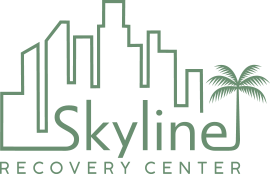Your loved one is drinking more and more – you can see them spiraling. You are worried. But when you broach this, they simply say, “You’re overreacting,” or “It is not that big of a deal.” Sounds familiar? You are not imagining it, and you are not alone.
Denial of alcoholism is a very real thing – an impediment. Millions around the world struggle with alcohol use disorder or alcoholism, but very few seek the care they need and deserve. One of the major reasons why this is the case is denial. Many do not often recognize that their drinking has become dangerous. While some may not meet the diagnosis of an alcohol use disorder, they still engage in problematic patterns of drinking that negatively impact their lives. Even so, they will insist, “I’m fine.”
Denial stems from different reasons – but undeniably, its roots lie in psychological factors. In this article, we will explore denial in alcoholism and how to talk to an alcoholic in denial so that you can support your loved one in a way that leads to real, lasting change.
What Denial in Alcoholism Looks Like?
Signs of denial in alcoholism can vary from person to person, but some of the more commonly recognizable signs are as follows:
Secrecy: Someone who is struggling with alcoholism can go to extreme lengths to hide their problematic drinking behaviors. For instance, they may drink in secrecy, lie about their drinking habits, or use mouthwash or mints to conceal the alcohol on their breath, among others.
Being Dismissive: If you confront an alcoholic (a label professionals no longer use) on their drinking patterns, they may casually dismiss it as nothing serious. For instance, they can tell you they only drink occasionally, even when you know otherwise.
Becoming Defensive: As with dismissiveness, they can also become defensive of their drinking patterns so as to justify their drinking.
Rationalizing: Alcoholics in denial can also rationalize their alcoholism by saying everyone drinks, so their drinking is no different or even a big deal.
Shifting Blame: Alcoholics in denial can shift the blame of their drinking patterns onto other external factors. For instance, they can blame their spouse, job, or any other life transition they may be going through.
Comparisons: A person in denial of their alcohol use disorder can compare themselves to others to show their drinking behaviors in a positive light. More often than not, they use examples of extremely unhealthy drinking behaviors to justify their alcoholism. But in reality, both are dangerous.
Psychological Roots Behind Denial
One of the tell-tale signs of alcohol use disorder is that people with this condition have a difficult time controlling their drinking. So, denial – which is considered to be a defense mechanism, becomes their way of dealing with realities that are very uncomfortable to face head-on.
In fact, denial is unconscious, as the person may not even be aware that they are denying their alcoholism. It also partly explains why an alcoholic continues to use alcohol despite its adverse effects on physical and mental health. It is also one of the main reasons why alcoholics do not seek the care they need at an early stage.
While denial is common, it does not mean everybody who struggles with alcoholism is living in denial. Many also acknowledge that there is a problem that needs to be addressed. This is the beginning of a very powerful change.
How to Talk to an Alcoholic in Denial?
Denial minimizes the severity of alcohol use disorder and stops one from seeking the care they need and deserve. So, as a loved one, you are in a good position to speak to someone in denial of their alcoholism. This is indeed a huge responsibility, but you can do it by following the given steps here:
- Choose the right place and time to speak to your loved one. Do it when they are sober and in a relaxed setting.
- Be non-judgmental in your approach; avoid labeling, blaming, or shaming the person. This only exacerbates the problem and achieves nothing.
- Be sure to cast alcoholism as the enemy, and not the person. Express care and concern while sharing your point of view. Use “I” statements while sharing your observations of their drinking.
- Listen to your loved one. Offer them an open space where they can be candid with you and share their concerns. Ask them open-ended questions so that you can get them to introspect and move toward change.
- Denial is going to be a part of your conversation, so be prepared for it. But at the same time, offer support and understanding even as you encourage them to seek care. Respect their decisions, and do not push them toward anything. The decision to recover must come from within.
- Speak to licensed mental health practitioners for guidance and direction. Keep their contacts with you so that you can provide some practical resources for your loved one whenever they are ready to move toward recovery.
Strategies for Intervention and Support
Self-Care and Boundaries: Alcoholism does not just affect the person – it affects families and communities. If your loved one is struggling with alcohol use disorder, it can take away a lot from you as well. But do not lose sight of yourself in this struggle. Take care of yourself – have interests and passions outside of this relationship, and surround yourself with loved ones who care for you.
Drawing personal boundaries is highly crucial as well:
- Identify your principles and priorities while also identifying your limits.
- Communicate your boundaries to your loved one. For instance, “I will not tolerate alcohol at home.”
- Enforce your boundaries. Maintain them by being consistent.
- Do not make excuses for or rescue your loved one from the consequences of their alcoholism.
Family and Friends: You can involve your other family and friends when you are talking to your loved one in denial of their alcoholism. They can offer a neutral perspective as well as a shoulder for support in navigating these difficult conversations.
Professional Help: Sometimes, it is not helpful to handle everything on your own. You do not have to either. Professional help is always available for you – you can reach out to mental health practitioners who are skilled at anticipating denial and expertly managing individual and family dynamics when it comes to alcohol use disorder.
Safety First: Prioritize your own safety. Alcohol use disorder can turn dangerous for those around alcoholics as well. If you feel your safety is in jeopardy at any point in time, call your loved ones or leave the environment. You can also call emergency providers like 9-1-1 in the U.S.
Recovery: Treatment Options
Alcohol use disorder is a complex condition influenced by genetics, environment, community, and culture. It is marked by heavy and prolonged drinking. The Centers for Disease Control and Prevention (CDC) defines this as:
- 15 or more drinks in a week for males.
- 8 or more drinks in a week for females.
Alcoholism is a severe condition that impacts health, well-being, and relationships. It takes away from the general experience of life itself as it changes the brain chemistry and functioning in a way that alcohol becomes the single most important priority in life – over food, hygiene, self-care, relationships, and career.
Dire as it may seem, alcoholism is not the end-all, be-all. It is a challenge, and there is a light at the end of this tunnel in the form of recovery. The care options for alcohol use disorder have improved by leaps and bounds over the past few decades. Today, it can be treated in both inpatient and outpatient settings.
While inpatient rehabilitation (rehab) lasts for a month and takes the person away from familiar triggers and temptations, outpatient rehab, like a partial hospitalization program or intensive outpatient program, offers intensive care and structure for scheduled hours during the day while allowing the person to return to their home or sober living residence afterward.
Alcohol use disorder is typically treated with medically supervised detoxification (detox), psychotherapy, medication, social support, and aftercare involving ongoing therapy/counseling, relapse prevention, sober living, and 12-step recovery programs like Alcoholics Anonymous.
Put simply, there is no one-size-fits-all approach to alcohol use disorder. For effective treatment and recovery, your or your loved one’s care needs to be tailored to your needs, goals, and circumstances. So, at Skyline Recovery, we offer personalized care options for alcohol use disorder, where we listen to your story and craft a recovery plan built around your needs, challenges, strengths, and goals.
If you or a loved one is struggling with alcoholism, do not delay your recovery any longer. Reach out to us today, and let us take this journey toward sobriety together.


